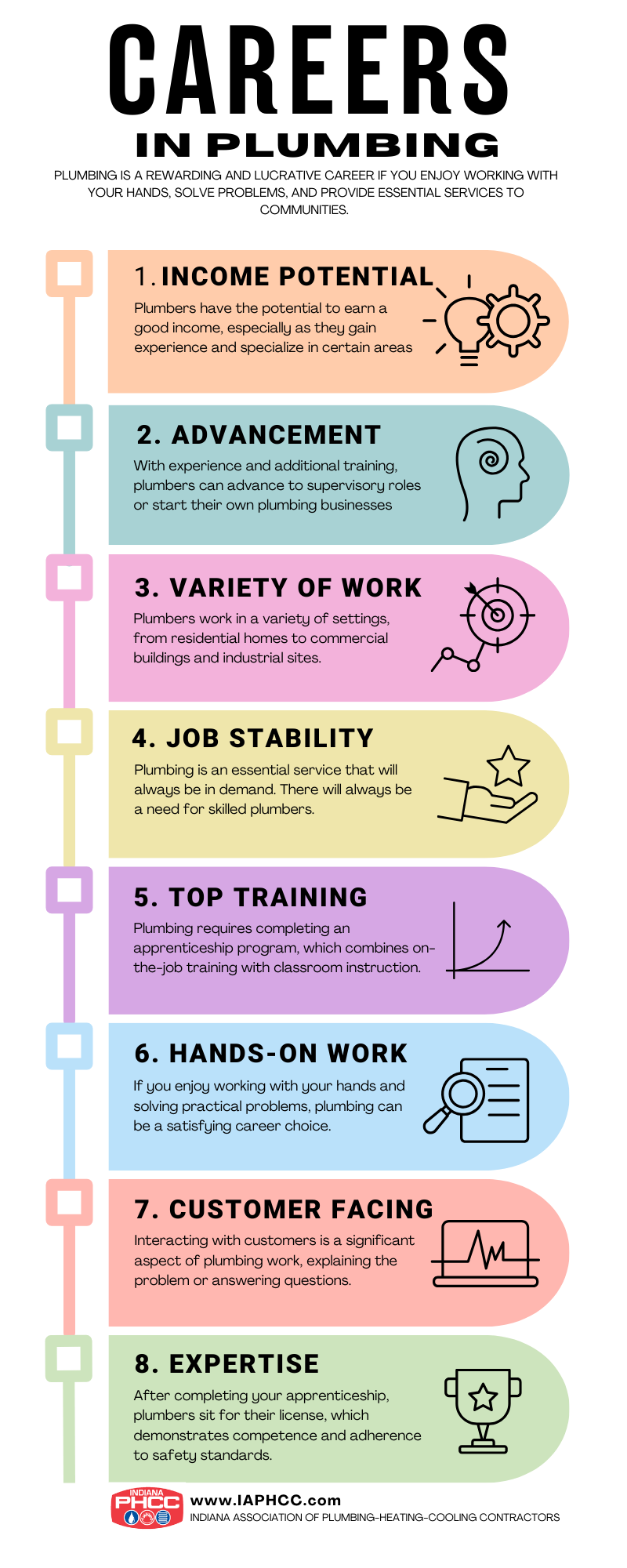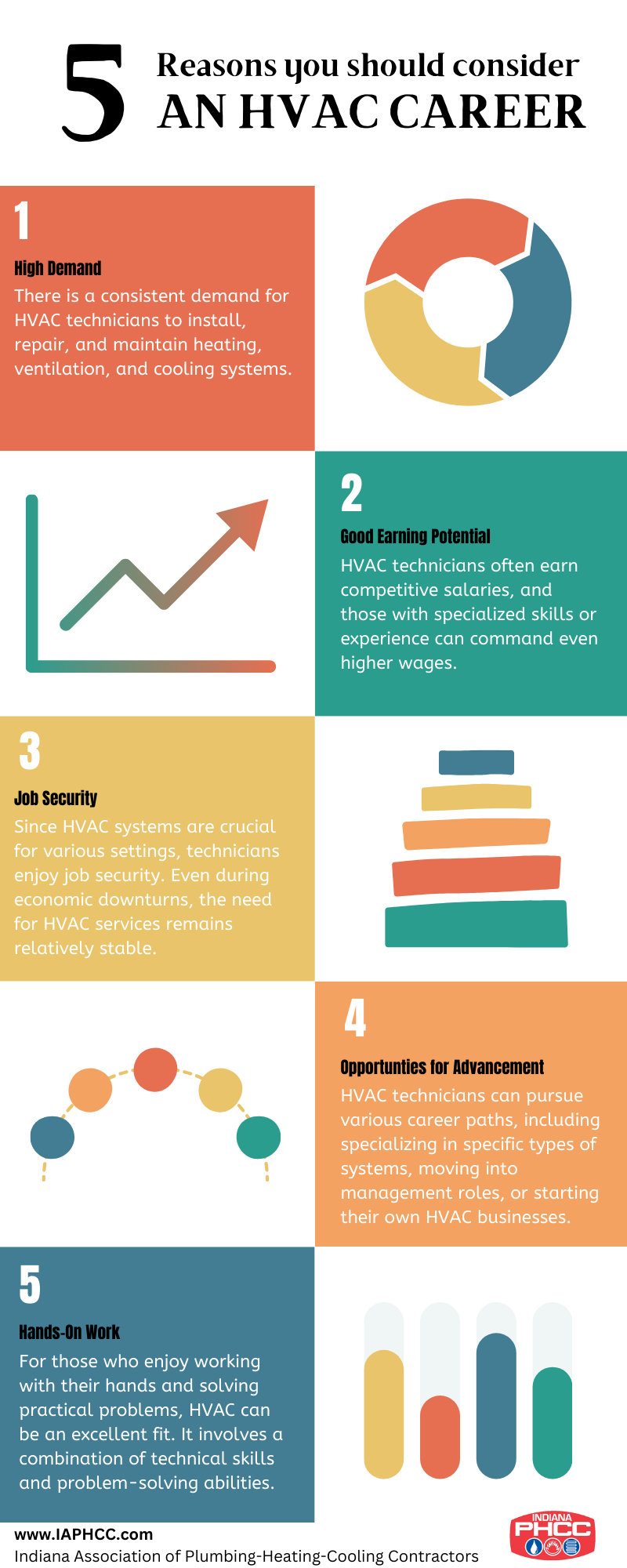
Who makes more money? A freshly minted plumber or a 4-year college graduate with a liberal arts degree? If you guessed the plumber, you're right! It doesn't stop there. In recent years, the average experienced plumber made $53,820. In major cities where plumbers are in high demand, these skilled tradesmen will make much, much more! Trained and licensed HVAC technicians can also realize great pay and benefits.
Plumbing professionals have been named one of the Hoosier Hot Jobs for Indiana! Here's why: In addition to being a job with great pay and no student debt, a skilled plumber can easily find a job due to high demand. Heating and cooling contractors are also seeking great HVAC technicians throughout the state. The opportunities in the plumbing, heating and cooling profession is not slowing down. Even better, your job can't be outsourced or replaced by artificial intelligence!
Today's plumbing-heating-cooling professions give you both a career-ready education and a paycheck. If you do not know your career path, are good with your hands, have a good math skills, and are not interested in taking out student loans - then consider these highly skilled roles for your career path. For many individuals, becoming a licensed plumber or HVAC technician are your first steps toward being a business leader or business owner.
Starting a career in the plumbing-heating-cooling profession could be one of your best decisions ever! In addition, most employers offer job benefits such as a company truck and tools.


Is plumbing a dirty job?
Plumbing is a crucial profession that involves keeping our water systems functioning smoothly. It's about ensuring clean water reaches homes and businesses and managing wastewater effectively. While it can involve getting your hands dirty at times, the work plumbers do is essential for public health and sanitation. Plus, there's a real skill and expertise involved in diagnosing and fixing plumbing issues, which many people greatly appreciate. So, while it might not always be glamorous, it's definitely not a dirty job in the negative sense!
Plumbing can indeed involve working in less than pristine conditions. Plumbers often have to deal with sewage, grease, and other unpleasant substances as they repair and maintain pipes and fixtures. You ask most plumbers, and they will tell you that this part of the job is about 15% of what they do. There are physically demanding and sometimes messy parts of the job - like any in the trades profession. So while it may be dirty at times, it's an essential and respectable profession.
What do plumbers do?
Plumbers are skilled tradespeople who specialize in installing, maintaining, and repairing systems used for water, sewage, drainage, and gas in homes, businesses, and other buildings. Here are some of the tasks plumbers typically perform:
Overall, plumbers play a crucial role in maintaining the infrastructure that delivers clean water and removes waste from our homes and buildings, contributing to public health and safety.
Are plumbers paid well?
Many plumbers will make a great wage - one that can support a family. It is hard work but the effort is rewarded nicely. Further, plumbers who are interested in leadership roles and even owning their own business have a great pathway to doing so. With the training provided to them though their apprenticeship, the plumbing professionals are some of the most knowledgeable professionals on the job sites. This knowledge can lead to project management roles and leadership positions. But working an entire career as a journeyman plumber will provide you with a nice financial lifestyle.
What does an HVAC technician do? HVAC technicians install, maintain, and repair heating, ventilation, and air conditioning systems in various settings, including homes, businesses, and industrial facilities. They work with furnaces, boilers, air conditioners, heat pumps, ventilation systems, and refrigeration units to ensure proper functioning and efficiency.
What qualifications are needed to become an HVAC technician? While requirements vary by location and employer, most HVAC technicians need a high school diploma or equivalent. Many pursue vocational training programs or apprenticeships offered by trade schools, community colleges, or within the company. Obtaining certification from organizations like the Environmental Protection Agency (EPA) and North American Technician Excellence (NATE) can also enhance job prospects.
How long does it take to become an HVAC technician? The time it takes to become an HVAC technician varies depending on the educational path chosen. Some vocational programs can be completed in as little as six months, while apprenticeships typically last three to five years. Certification exams may require additional study time.
What is the job outlook for HVAC technicians? The demand for HVAC technicians is generally strong due to the need for climate control systems in residential and commercial buildings. As buildings become more energy-efficient and require updated HVAC systems, job opportunities for technicians are expected to grow.
What is the salary range for HVAC technicians? HVAC technicians' salaries vary depending on factors such as experience, location, but the pay can provide a nice financial lifestyle.
What are the working conditions like for HVAC technicians? HVAC technicians often work indoors but may also need to work outdoors in various weather conditions. They may encounter cramped spaces, heights, and exposure to potentially hazardous materials. The job can be physically demanding but also rewarding for those who enjoy problem-solving and hands-on work.
Is there room for specialization within the HVAC field? Yes, HVAC technicians can specialize in areas such as commercial HVAC systems, refrigeration, controls and automation, or green technologies. Specialized training and certifications can open up opportunities for advancement and higher-paying positions.
What are the steps to becoming licensed or certified as an HVAC technician? Licensing requirements vary by city and county in Indiana. Most jurisdictions require HVAC technicians to pass an exam demonstrating their knowledge of HVAC systems and safety regulations. Certification from organizations like NATE or the Refrigeration Service Engineers Society (RSES) can also demonstrate expertise and professionalism.
Are there opportunities for career advancement in the HVAC industry? Yes, HVAC technicians can advance to roles such as lead technician, supervisor, project manager, or even start their own HVAC business. Continuing education, gaining additional certifications, and staying updated on industry trends can help technicians advance their careers.
What resources are available for HVAC training and education? Many trade schools, community colleges, and technical institutes offer HVAC training programs. Additionally, apprenticeship programs provide hands-on experience and classroom instruction. Online courses and self-study resources are also available for those seeking to expand their knowledge and skills in the HVAC field.